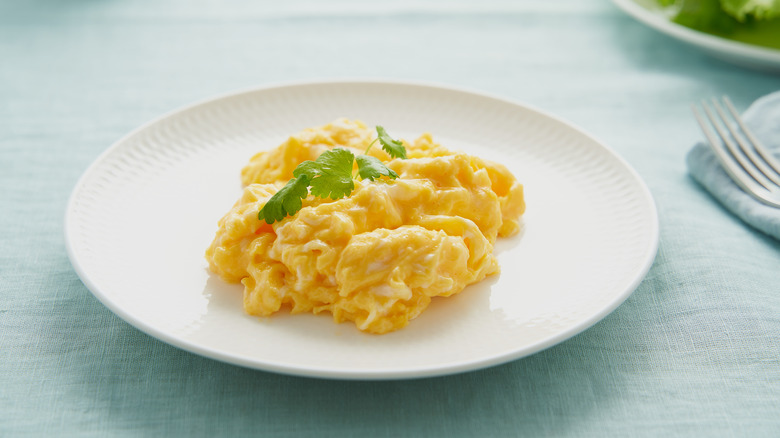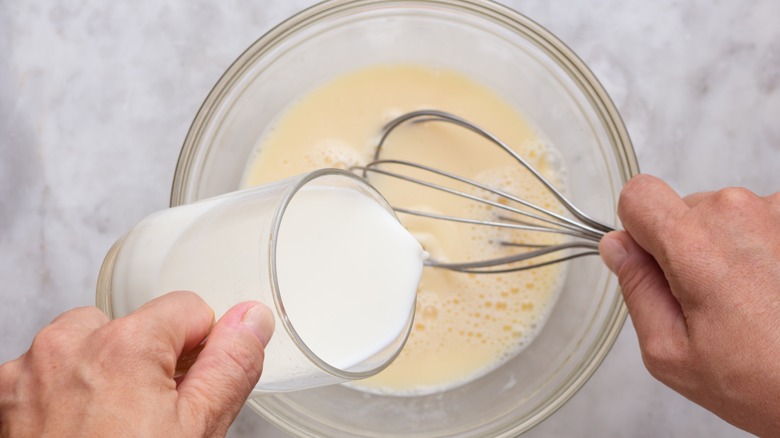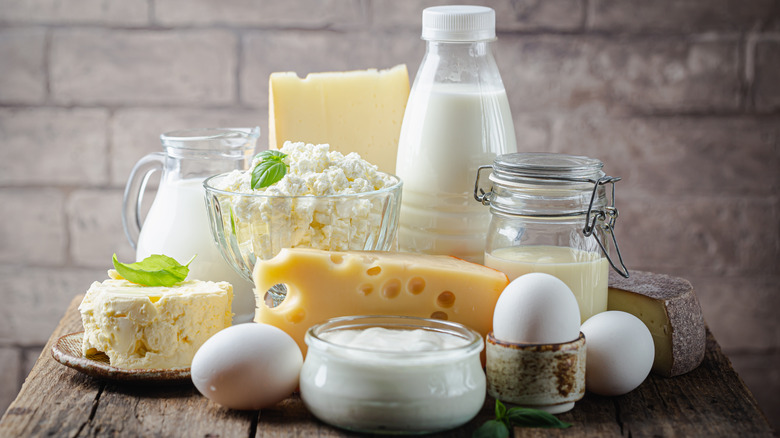How Swapping Water For Milk Affects The Fluffiness Of Your Scrambled Eggs
Scrambled eggs cooked just the way you like them can make for an indulgent breakfast or snack. While this egg dish isn't difficult to make, it can be a fickle one to master. This is partly because people like their scrambled eggs cooked differently, but also — and this is where things get complicated — because there are so many ways to make them. Everyone from professional chefs to amateur home cooks has a scrambled eggs hack they swear by, and quite often, it's something as simple as adding a bit of water or milk to the egg mixture.
Great scrambled eggs are fluffy and moist, walking a fine line between the two danger zones of overcooked and rubbery or undercooked and runny. Adding a bit of water during the whisking process can help you achieve that fluffiness while ensuring your eggs remain moist. Milk, on the other hand, can lend creaminess to the final dish.
Cooking scrambled eggs takes a matter of minutes, so you need to have your eye on the ball the whole time. Adding just the right amount of mix-in liquids like milk or water and keeping an eye on the heat can make all the difference. Understanding the process will help you control exactly how you want your dish to turn out the next time you set about making a plate of scrambles.
Scrambling eggs with water vs. milk
Eggs undergo a few crucial changes from the moment you start heating them up in a skillet. The yolk and whites are made of proteins, which remain in liquid form in the raw state. Per Scientific American, when heated, these egg proteins bind to form a network. This network of proteins also traps water, which helps eggs retain their moisture.
Adding some water to your whisked egg mixture before cooking will have two effects. First, more water will get trapped within the egg proteins as they cook, resulting in a more moist final dish. Second, some of this water will turn to steam, giving the eggs a fluffier texture. As simple as this sounds, it is equally easy to muddle things up. The amount of water you add is crucial. Since egg proteins have a limited capacity for holding moisture, any excess water will seep out to form an unsightly eggy puddle around your dish. Water will also dilute the flavor of your eggs. Ideally, between half and one teaspoon of water per egg should be added to the whisked and seasoned egg mixture.
When you use milk instead of water, the scrambled eggs will not turn out as fluffy. This is because milk will not steam the eggs as effectively as water. However, you will get a creamier texture and flavor by using milk. Adding creaminess to scrambled eggs can help make the dish more decadent, but egg purists might not like the dilution of the subtle egg flavors.
Try these alternate mix-ins
Scrambling eggs perfectly is a bit like landing a plane. You must closely monitor the cooking process, and everything has to be timed perfectly. Thankfully adding a mix-in can lead to more consistently good scrambled eggs because, in addition to making the eggs moist or creamy, it can also help moderate the cooking process.
In particular, scrambled eggs are prone to overcooking, particularly because they continue to cook in their residual heat even after you've turned the burner off. To prevent this, chefs like Gordon Ramsey finish their scrambled eggs with a bit of crème fraîche or another cold dairy product to bring down the temperature of the eggs and stop the cooking process. It also results in exceptionally silky scrambles. Buttermilk is also a popular option, and adding a tablespoon of it per egg into the raw mixture will give you creamy scrambled eggs with a hint of tanginess from the buttermilk. According to J. Kenji López-Alt's tips for creamy scrambled eggs, small cubes of cold butter can also be added to the whisked eggs. The butter creates cooler pockets in the cooking eggs, creating a nice textural contrast.
While adding a little water will definitely give you fluffier scrambles, add-ins like buttermilk and even half-and-half can give you a nice balance of creaminess and fluffiness without diluting the egg flavor too much. If added at the last moment, they'll also help stop the cooking process before your eggs become overcooked. Ultimately, there are many ways that cooking scrambled eggs can go wrong. The good news is that there are almost as many ways to get it right.


